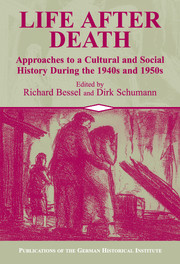Book contents
- Frontmatter
- Introduction Violence, Normality, and the Construction of Postwar Europe
- 1 Post-Traumatic Stress Disorder and World War II
- 2 Between Pain and Silence
- 3 Paths of Normalization after the Persecution of the Jews
- 4 Trauma, Memory, and Motherhood
- 5 Memory and the Narrative of Rape in Budapest and Vienna in 1945
- 6 “Going Home”
- 7 Desperately Seeking Normality
- 8 Family Life and “Normality” in Postwar British Culture
- 9 Continuities and Discontinuities of Consumer Mentality in West Germany in the 1950s
- 10 “Strengthened and Purified Through Ordeal by Fire”
- 11 The Nationalization of Victimhood
- 12 Italy after Fascism
- 13 The Politics of Post-Fascist Aesthetics
- 14 Dissonance, Normality, and the Historical Method
- Index
7 - Desperately Seeking Normality
Sex and Marriage in the Wake of the War
Published online by Cambridge University Press: 05 January 2013
- Frontmatter
- Introduction Violence, Normality, and the Construction of Postwar Europe
- 1 Post-Traumatic Stress Disorder and World War II
- 2 Between Pain and Silence
- 3 Paths of Normalization after the Persecution of the Jews
- 4 Trauma, Memory, and Motherhood
- 5 Memory and the Narrative of Rape in Budapest and Vienna in 1945
- 6 “Going Home”
- 7 Desperately Seeking Normality
- 8 Family Life and “Normality” in Postwar British Culture
- 9 Continuities and Discontinuities of Consumer Mentality in West Germany in the 1950s
- 10 “Strengthened and Purified Through Ordeal by Fire”
- 11 The Nationalization of Victimhood
- 12 Italy after Fascism
- 13 The Politics of Post-Fascist Aesthetics
- 14 Dissonance, Normality, and the Historical Method
- Index
Summary
In the first seven or eight years after the end of World War II, the western German press and publishing landscape was filled with essays and books addressing what was variously called the “marital crisis,” the “sexual crisis,” or the “sexual misery of our time.” One author titled his 1947 book The Tragedy of the Bedroom; another writer in 1949 opined that “marriage is sick through and through.” Not until the mid-1950s did the hyperventilated fascination with these themes subside. An analysis of the postwar writings on sexual topics suggests not only that the reconstruction of a domesticated heterosexuality was an important component of the transition from fascism to Western democracy, but also that for quite some time it was not at all self-evident what sort of sexual politics would emerge from the wreckage of 1945.
Each contributor to the postwar debates defined the problem of “marital crisis” or “sexual crisis” differently. Some authors referred to the high rates of marital discord in the wake of so many multiyear spousal separations caused by war and postwar imprisonments. News articles, popular advice columns, and professional literature alike repeatedly thematized both the need to help individuals leave unhappy partnerships through divorce and the possibility that with mutual effort and sensitivity damaged relationships could be repaired.
- Type
- Chapter
- Information
- Life after DeathApproaches to a Cultural and Social History of Europe During the 1940s and 1950s, pp. 161 - 192Publisher: Cambridge University PressPrint publication year: 2003
- 3
- Cited by



